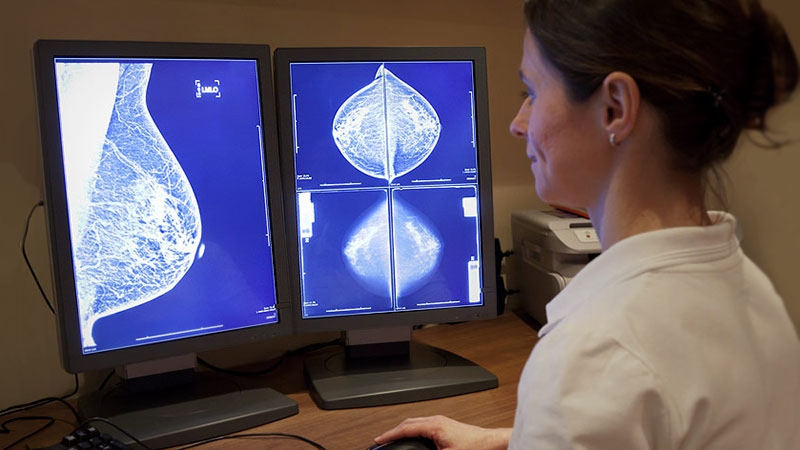AI Improves Mammography Accuracy and Reduces Workload Significantly
Core Concepts
AI-assisted mammography significantly reduces workload, improves cancer detection, and maintains low false positive rates.
Abstract
The study discussed in this summary focuses on the impact of artificial intelligence (AI) in mammography screening. Here is a breakdown of the key points:
Key Takeaway
AI-assisted mammography reduces workload and enhances cancer detection without increasing false positives.
The study included over 80,000 women in a randomized trial.
Why This Matters
Previous studies have shown AI's positive impact on mammography screening accuracy and workload.
This study is the first prospective, randomized trial to explore AI in mammography screening.
Study Design
The MASAI trial randomly assigned women to AI-supported mammography or standard double-reading mammography.
The AI system generated malignancy risk scores based on screening images, triaging women accordingly.
Radiologists in the AI arm had access to risk scores and computer-aided detection marks.
Key Results
AI-supported screening detected 20% more cancers than standard double reading.
The recall rate and false positive findings were comparable between the AI and standard care groups.
Radiologists had a 44% reduction in workload with AI support.
Limitations
Generalizability may be limited to practices with different AI and mammography systems or less experienced radiologists.
The interval-cancer rate's impact on false positives will be determined after 2 years of follow-up for the full study population.
Higher detection of in situ cancers with AI raises concerns about overdiagnosis.
Disclosures
The study was funded by the Swedish Cancer Society and others.
Lead researchers have affiliations with Siemens Healthineers and Screenpoint Medical.
AI Improves Mammography Accuracy, Reduces Workload
Stats
AI-supported screening detected 41 more cancers, a 20% increase over standard double reading.
The cancer detection rate was 6.1/1000 women in the AI group, vs 5.1/1000 with standard care.
Radiologists conducted 36,886 fewer readings in the AI arm, a 44% drop in screen reading workload.
Quotes
"The results confirm the benefits of AI in mammography and strongly support implementing it into screening programs."
Key Insights Distilled From
by M. Alexander... at www.medscape.com 05-08-2023
https://www.medscape.com/viewarticle/991695
Deeper Inquiries
How can the findings of this study be applied to healthcare systems with varying resources and expertise?
The findings of this study on AI-assisted mammography can be applied to healthcare systems with varying resources and expertise by showcasing the potential benefits of integrating AI into screening programs. Healthcare systems with limited resources can leverage AI to reduce the workload of radiologists, improve cancer detection rates, and maintain low false positive findings. By implementing AI systems like Transpara, even healthcare facilities with less experienced radiologists can enhance their mammography screening accuracy and efficiency. The study's results provide evidence that AI can be a valuable tool in improving mammography outcomes, regardless of the healthcare system's resources or expertise levels.
What are the potential drawbacks of relying heavily on AI in mammography screening?
While AI has shown promising results in improving mammography accuracy and reducing radiologists' workload, there are potential drawbacks to relying heavily on AI in screening programs. One drawback is the issue of overdiagnosis, as highlighted by the higher detection of in situ cancers with AI in the study. Overdiagnosis can lead to unnecessary treatments and psychological distress for patients. Additionally, there may be concerns about the generalizability of AI systems across different healthcare settings and the reliance on technology over human expertise. Healthcare providers must also consider the cost of implementing and maintaining AI systems, which could be a barrier for some facilities. Finally, the potential for technical errors or biases in AI algorithms could impact the reliability of mammography screening results.
How can AI be leveraged to improve other areas of cancer detection and treatment beyond mammography?
AI can be leveraged to improve other areas of cancer detection and treatment beyond mammography by enhancing diagnostic accuracy, treatment planning, and patient outcomes. In cancer detection, AI can analyze medical imaging, genetic data, and clinical records to identify patterns and markers that may indicate the presence of cancer at an early stage. AI algorithms can assist in personalized treatment recommendations based on individual patient data, leading to more targeted and effective therapies. Furthermore, AI can help in monitoring disease progression, predicting treatment responses, and identifying potential side effects. By integrating AI into various aspects of cancer detection and treatment, healthcare providers can optimize patient care, improve survival rates, and enhance overall quality of life for cancer patients.
0
